Sam Altman sits across from a group of Boost Mobile executives in Irvine, California. It’s 2005, and he’s just 19 years old, dressed in cargo shorts and sitting cross-legged in an office chair. The executives are skeptical.
This kid looks like he could’ still be in high school.
Lowell Winer, Boost’s head of business development, had no idea who Altman was when he received the call that morning. The young CEO of a tiny startup called Loopt urgently requested a meeting. Boost was days away from signing a contract with another company for a location-based mobile feature.
But Altman had stayed up all night building a crude version of his app to run on Boost’s network. He hopped on the first flight out. Within 30 minutes of walking into that conference room, he had convinced them to abandon the existing deal and sign with his company instead.
Today, at 40, he runs OpenAI, the company behind ChatGPT, and arguably the most influential AI research organisation in the world. The decisions he makes at OpenAI shape how millions of people currently interact with artificial intelligence.
But the path from that Boost Mobile meeting to leading the AI revolution wasn’t smooth. Altman has been fired from companies he founded, faced accusations of dishonesty from former allies and survived a boardroom coup that nearly destroyed OpenAI.
The question at the heart of Altman’s rise is whether we can trust someone this hungry for power to oversee technology that could reshape civilisation. To answer that, we need to know his journey.
Crypto Investing Without the Crypto Chaos
Forget seed phrases, exchange hacks, and late-night wallet setups.
With Grayscale, you can invest in Bitcoin, Ethereum, and other digital assets the same way you’d buy a stock — through regulated, SEC-reporting products.
No private keys to manage
No unregulated exchanges
No steep learning curve
It’s the easiest way for individuals and institutions alike.
The Kid Who Learned to Code at Eight
Sam Altman was born on April 22, 1985, in Chicago, Illinois, to a Jewish family that soon moved to St. Louis, Missouri. His mother worked as a dermatologist, and his father was a real estate broker. Sam was the oldest of four siblings in what appeared to be a stable, middle-class household.
At the age of eight, he received his first computer, an Apple Macintosh. He quickly learned to program and took apart hardware, trying to understand how everything worked at a fundamental level.
The Macintosh was more than a hobby. Growing up gay in the conservative Midwest during the 1990s, Altman found refuge in technology. The computer didn’t judge. It simply responded to logic and skill.
At John Burroughs School, a prestigious private institution in St. Louis, Altman stood out as a talented debater and student leader. In what must have taken considerable courage, he stood up during a school assembly and announced he was gay. When some students wanted to boycott an assembly about homosexuality on religious grounds, Altman confronted them publicly.
His English teacher, Andy Abbott, remembers young Sam as exceptional at everything he tried. “Everyone knew this guy was better at most things than most of us are,” Abbott says. He seemed to overflow with self-confidence, even as a teenager.
Abbott hoped Altman would become an author rather than going into technology. “I remember thinking — and this is an embarrassing confession — I hope he doesn’t go into technology. He’s so creative.”
But Altman had his sight set on Silicon Valley. In 2003, he enrolled at Stanford University to study computer science, following the well-worn path of many tech entrepreneurs. The Valley was entering a new boom cycle after the dot-com bust.
Two years into his studies, Altman dropped out of Stanford. He had an idea.
What if your phone could tell you when friends were nearby? In 2005, before the iPhone existed, Loopt aimed to use GPS coordinates to connect users with people in their social network. The problem was the technology barely existed yet.
Altman applied to Y Combinator’s first batch in Cambridge, Massachusetts. Paul Graham and Jessica Livingston, who ran YC, were immediately struck by Altman’s maturity. Graham later wrote that within three minutes of meeting him, he thought: “Ah, so this is what Bill Gates must have been like when he was 19.”
For three months, Altman huddled with seven other young founders in Graham’s home, trying to build businesses that were at least “ramen profitable”, making enough money for the founders to survive on instant noodles. The early YC batch would eventually produce notable companies like Reddit and Twitch, but Altman stood out from day one.
In 2007, Altman appeared on stage with Steve Jobs at Apple’s developers conference, demonstrating Loopt on the newly launched iPhone. For the occasion, he wore two polo shirts layered one over the other. Hot pink on top with a lime green collar underneath. The fashion choice was questionable, and would later become the subject tech memes.
Graham praised Altman repeatedly on his influential blog during this period, describing him as having “such force of will that he’s going to get whatever they want.”
In 2009, when Graham invested in Stripe, he invited Altman into the round. Altman wrote a $15,000 check for 2% of the company.
But Loopt itself was fizzling. Despite raising over $30 million in venture capital, the app never found product-market fit. In 2012, Altman sold the company to Green Dot Corporation for $43.4 million, which was not much more than investors had put in. By Silicon Valley standards, this qualified as a failure.
However, Altman failed upward. In 2014, when Graham wanted to step down from Y Combinator, he considered only one candidate to replace him.
At 29, Altman became president of Y Combinator. His strategy was aggressive expansion. YC dramatically increased the number of startups accepted and raised $700 million to invest in alumni companies. He launched a universal basic income experiment in Oakland, distributing regular payments with no strings attached.
Mark Andreessen, a venture capital titan, said that under Altman, “the level of YC’s ambition has gone up 10 times.” By the time Altman stepped down, YC’s portfolio had grown to a combined valuation over $100 billion.
The OpenAI Gambit
In late 2015, while still running Y Combinator, Altman assembled a group of Silicon Valley’s most successful people to launch OpenAI. Their pitch was that they would build artificial intelligence to benefit humanity.
The backers, including Elon Musk, Peter Thiel, Reid Hoffman, and Graham, pledged $1 billion to fund what was structured as a nonprofit research lab.
The problem was talent. Google controlled about 75% of the world’s top AI researchers. So Altman and Musk organised a private dinner and invited the best AI experts they could recruit. They made a list of the ten researchers they most wanted and managed to hire nine of them.
For several years, OpenAI operated quietly as a research organisation. But Altman saw that it needed to evolve. In 2019, he stepped down from Y Combinator to become OpenAI’s full-time CEO. The organisation restructured, creating a “capped-profit” subsidiary that could attract investment while theoretically maintaining its nonprofit mission.
This structural change later became controversial, with critics arguing it betrayed OpenAI’s founding principles. But for Altman, it was a pragmatic necessity. Advanced AI research required massive computing resources, which required massive funding.
The breakthrough came in 2020 with GPT-3, a language model that could generate human-like text, translate languages, and summarise complex documents. Then came DALL-E, which could generate images from text descriptions. These tools impressed AI researchers but were still largely academic curiosities.
Everything changed with ChatGPT.
In late 2022, OpenAI released ChatGPT to the public. The reception was unlike anything Silicon Valley had seen. The chatbot reached 100 million users in less than two months, making it the fastest-growing consumer application in history. Faster than Facebook, Google, Instagram, TikTok, faster than anything else.
The success shocked even Altman. According to Greg Brockman, most engineers including Brockman himself had opposed building a simple chatbot. They thought it wasn’t worth the time. Altman overruled them. His intuition proved correct.
ChatGPT demonstrated that AI had moved from research labs into practical applications anyone could use. The success thrust Altman into the global spotlight. He testified before Congress about AI regulation and became one of Time’s most influential people in 2023.
But with visibility came scrutiny. And in November 2023, that scrutiny exploded into crisis.
Five Days in November
On Friday, November 17, 2023, OpenAI’s board abruptly fired Altman as CEO. The board’s statement cited that Altman had been “not consistently candid in his communications with the board, hindering its ability to exercise its responsibilities.”
Within hours, hundreds of OpenAI employees signed an open letter, threatening to resign and follow Altman to Microsoft, which had offered him a position to lead a new AI research division.
The crisis revealed deep tensions within OpenAI regarding its mission and direction. Board members including co-founder Ilya Sutskever and academics Helen Toner and Tasha McCauley felt the company had diverged too far from its nonprofit mission. OpenAI’s recent developer conference, where Altman had announced multiple commercial products, appeared to be the final straw.
Toner had even published a paper criticising OpenAI’s safety measures and praising competitor Anthropic. She reportedly said at one point that shutting OpenAI down might be the best way to fullfill their mission of protecting society.
For five days, the tech world watched a boardroom drama unfold in real-time. Microsoft CEO Satya Nadella worked behind the scenes to mediate. Major investors pushed for Altman’s return. The board briefly hired Twitch CEO Emmett Shear as interim CEO, only to reverse course.
On November 22, Altman returned as CEO. The board that had fired him resigned. A new board with experienced tech executives took over, including former Salesforce CEO Bret Taylor and former Treasury Secretary Larry Summers.
Then came the Elon Musk war.
Perhaps the most complex relationship in Altman’s career has been with Elon Musk. The two co-founded OpenAI with a shared vision for the safe development of AI. However, the partnership deteriorated as OpenAI evolved from a purely nonprofit to a hybrid structure.
Musk stepped down from OpenAI’s board in 2018, citing conflicts of interest with Tesla’s own AI work. But he grew increasingly critical of OpenAI’s direction, arguing the organisation had abandoned its founding principles.
In 2024, Musk filed two separate lawsuits against Altman and OpenAI, alleging fraud, breach of contract, and prioritising commercial interests over safety. He began publicly calling Altman “Scam Altman” on X (formerly Twitter) and launched xAI, a direct competitor to OpenAI.
The legal battles continue. Musk argues for more transparency and open-source development, while Altman contends that commercial viability is necessary to fund the massive investments required for advanced AI research.
The Controversial Identity Project
While leading OpenAI, Altman co-founded another ambitious venture in 2019: Worldcoin, later rebranded as World Network. The project aims to create a global digital identity system by scanning people’s irises.
The concept addresses what Altman sees as a critical problem: How do you prove someone is human in an age of sophisticated AI? The solution involves specialised devices called “Orbs” that scan irises to create unique digital identities. Each verified person receives cryptocurrency tokens.
World Network has achieved remarkable scale, with over 17 million verified users across 160 countries as of 2025. But it has faced intense controversy. Privacy advocates worry about biometric data collection. Regulators in the EU, Kenya, and other countries have investigated or temporarily banned operations.
Critics argue the project is dystopian, trading biometric data for modest sums, particularly in developing countries where users may not fully understand the implications. Supporters counter that World Network generates cryptographic hashes rather than storing actual biometric data, and that verifying humanity will become increasingly important as AI advances.
The project has also seen significant financial success. Following treasury announcements and new partnerships in 2025, the WLD token surged in value. But regulatory challenges remain substantial.
Read: Worldcoin’s New Trust Economy 🌎
The Gentle Singularity
Despite the controversies, Altman remains focused on OpenAI’s mission and his vision for AI’s future. In September 2025, he published an essay called “The Gentle Singularity,” arguing that we’ve already passed the “event horizon” of AI development.
His predictions:
2025: AI agents capable of real cognitive work emerge
2026: AI systems begin generating novel scientific insights
2027: Robots start performing complex physical tasks
2030s: Intelligence and energy become abundant resources
Altman envisions a future where individual productivity increases dramatically through AI augmentation, leading to breakthroughs in fields ranging from physics to space colonisation. He’s betting that advanced AI will solve problems we currently consider intractable.
To fund this vision, OpenAI is planning infrastructure investments totalling $850 billion, including partnerships with Oracle and Nvidia. These investments would make OpenAI’s buildout one of the largest capital expenditures in technology history.
Despite his fame as OpenAI’s CEO, Altman holds no equity in the company. His estimated $1.8 billion fortune comes entirely from his investment portfolio, which includes stakes in over 400 companies.
His notable investments:
Reddit: Approximately $700 million stake from a $50 million investment
Stripe: 2% stake from his original $15,000 investment, now worth hundreds of millions
Helion Energy: Major investor in nuclear fusion startup valued at $5.4 billion
Airbnb: Early investment in the home-sharing platform
Altman’s investment philosophy emphasises “hard technology” companies working on challenging technical problems with the potential for massive impact. This approach has made him one of Silicon Valley’s most prolific individual investors.
Altman is also chairman of Helion Energy and has invested in Oklo Inc., a next-generation nuclear systems firm. His interests span from AI to energy to longevity research, reflecting his belief that technology can solve humanity’s biggest challenges.
The decisions Altman makes at OpenAI don’t just shape shareholders or employees. They affect how artificial intelligence develops and how it integrates into human civilisation.
There’s a photo of J. Robert Oppenheimer standing in the New Mexico desert in 1945, watching the first atomic bomb test. He later said he thought of a line from Hindu scripture: “Now I am become Death, the destroyer of worlds.”
Sam Altman doesn’t quote ancient texts when he talks about AI. He’s more likely to reference efficiency metrics or capital deployment strategies. But the parallel is hard to ignore. He’s building something that could reshape civilisation and he’s doing it while wearing cargo shorts and working from an iPad. The difference is that Oppenheimer had the Manhattan Project’s secrecy and government oversight. Altman has venture capital, a $76,000 salary, and a board that once fired him once already.
History will remember one of them as the father of the atomic age. The jury’s still out on what Altman becomes the father of.
That’s it about Altman. See you next week with another profile.
Until then … stay extremely curious,
Thejaswini
Token Dispatch is a daily crypto newsletter handpicked and crafted with love by human bots. If you want to reach out to 200,000+ subscriber community of the Token Dispatch, you can explore the partnership opportunities with us 🙌
📩 Fill out this form to submit your details and book a meeting with us directly.
Disclaimer: This newsletter contains analysis and opinions of the author. Content is for informational purposes only, not financial advice. Trading crypto involves substantial risk - your capital is at risk. Do your own research.



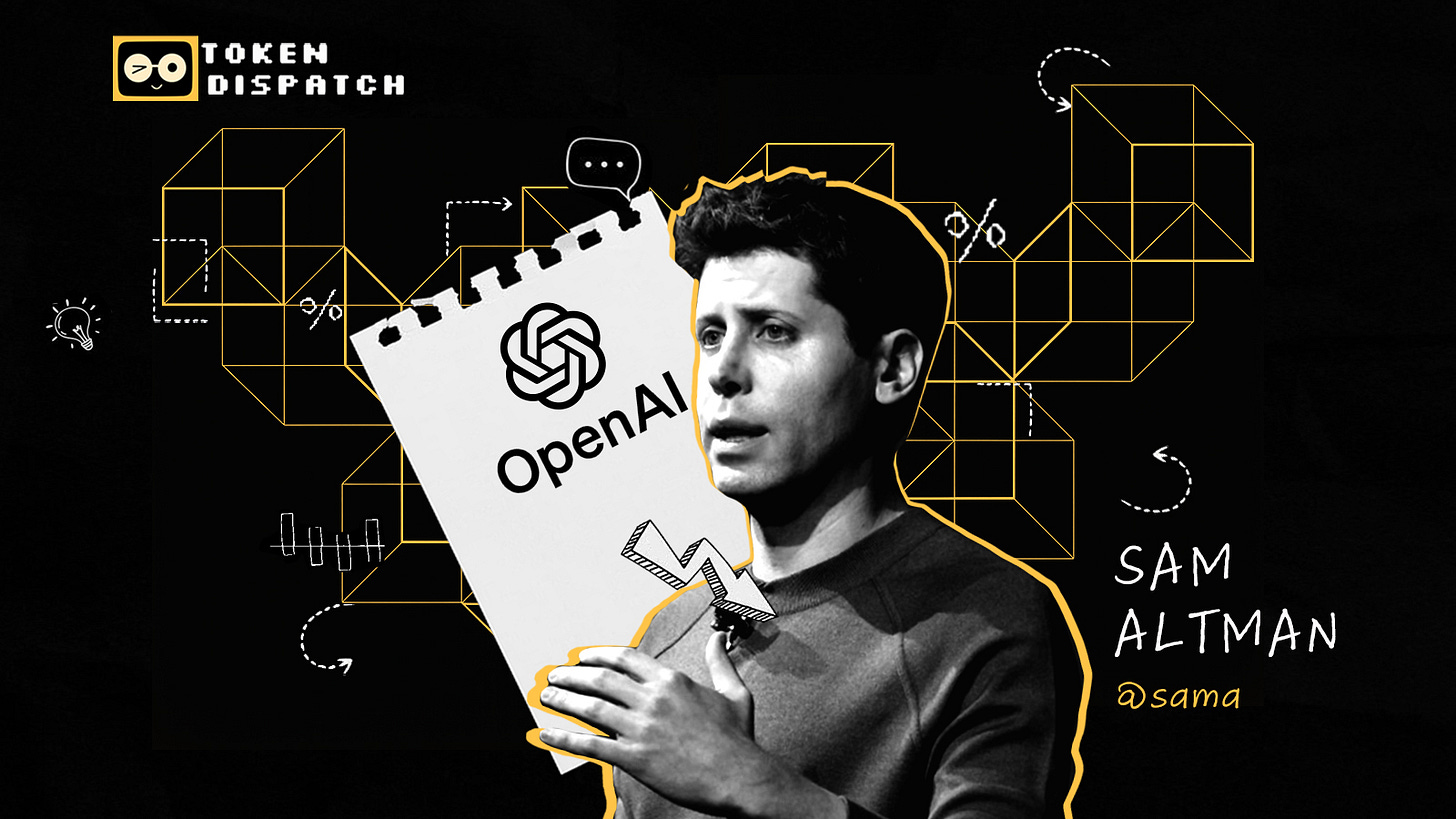

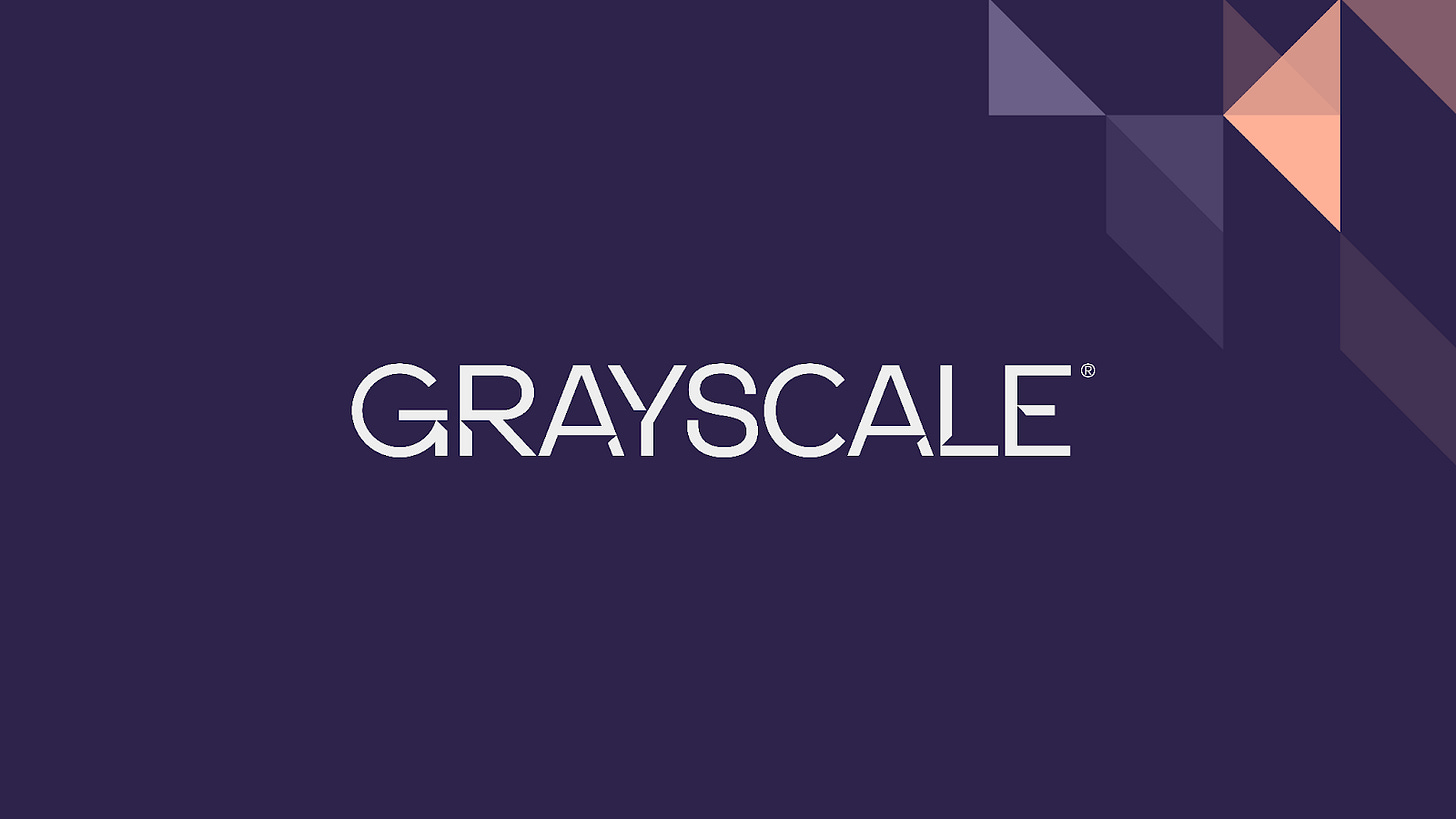
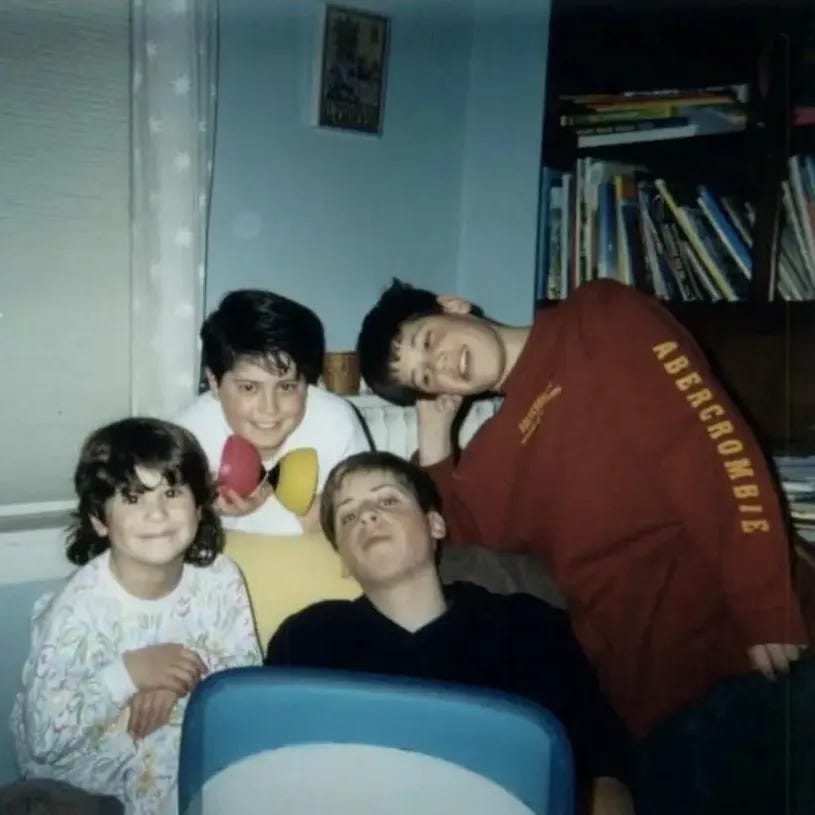
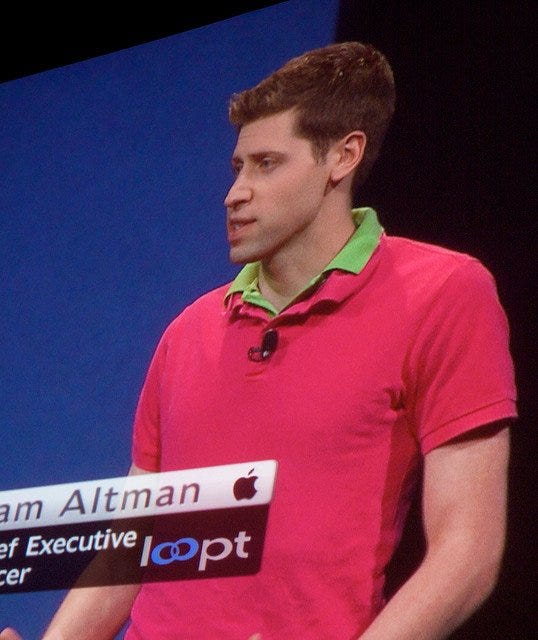

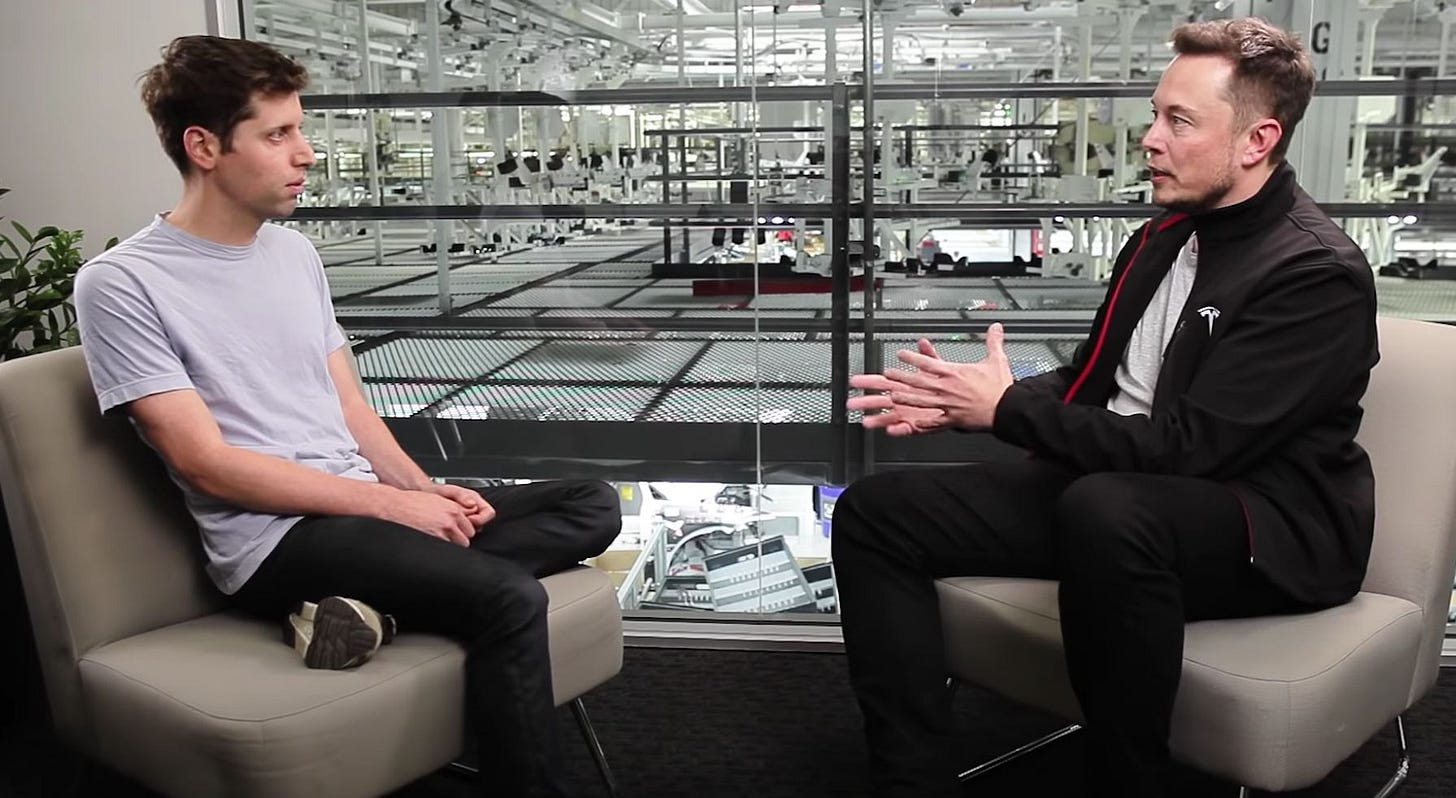

Nicely written, seemingly balanced and nuanced profile of one of the most important tech and thought leaders on the planet. Yet another guy smarter than I will ever be...altho with AI / AGI enhancement in my brain I may yet have a chance to be this prescient! Rudi Hoffman Port Orange, FL
Thank you for this profile… I knew pieces of his background so this is helpful to see how he progressed. Very interesting figure to emerge as a tech leader in this political climate.